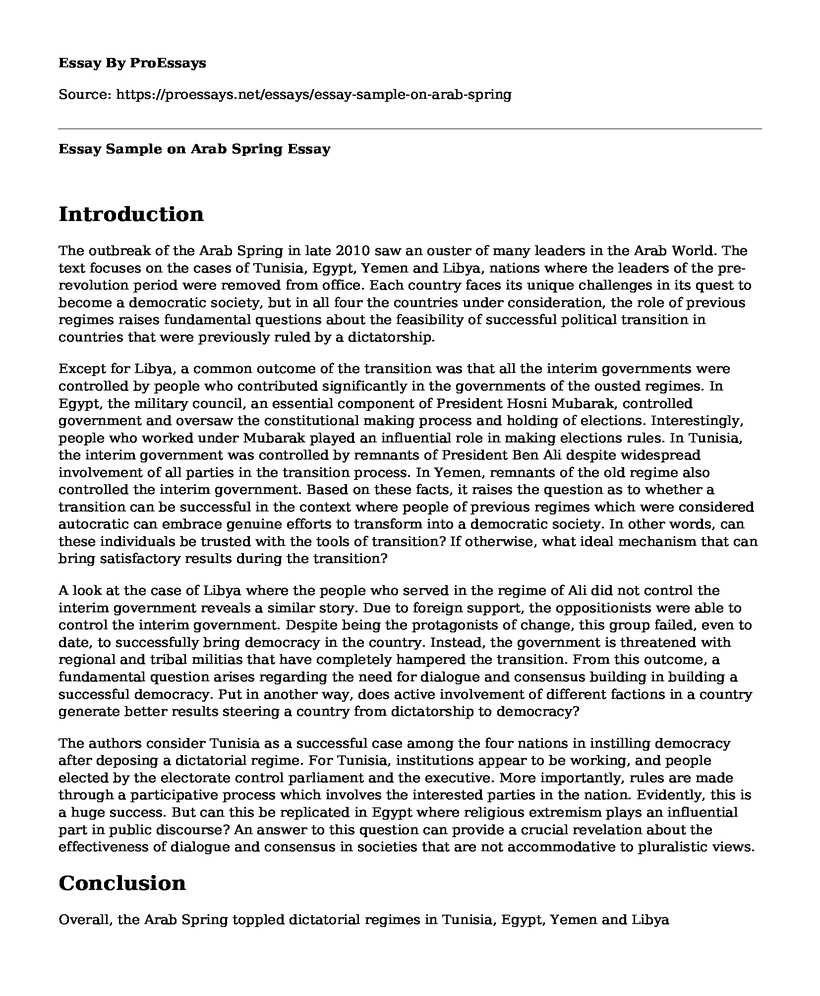Introduction
The outbreak of the Arab Spring in late 2010 saw an ouster of many leaders in the Arab World. The text focuses on the cases of Tunisia, Egypt, Yemen and Libya, nations where the leaders of the pre-revolution period were removed from office. Each country faces its unique challenges in its quest to become a democratic society, but in all four the countries under consideration, the role of previous regimes raises fundamental questions about the feasibility of successful political transition in countries that were previously ruled by a dictatorship.
Except for Libya, a common outcome of the transition was that all the interim governments were controlled by people who contributed significantly in the governments of the ousted regimes. In Egypt, the military council, an essential component of President Hosni Mubarak, controlled government and oversaw the constitutional making process and holding of elections. Interestingly, people who worked under Mubarak played an influential role in making elections rules. In Tunisia, the interim government was controlled by remnants of President Ben Ali despite widespread involvement of all parties in the transition process. In Yemen, remnants of the old regime also controlled the interim government. Based on these facts, it raises the question as to whether a transition can be successful in the context where people of previous regimes which were considered autocratic can embrace genuine efforts to transform into a democratic society. In other words, can these individuals be trusted with the tools of transition? If otherwise, what ideal mechanism that can bring satisfactory results during the transition?
A look at the case of Libya where the people who served in the regime of Ali did not control the interim government reveals a similar story. Due to foreign support, the oppositionists were able to control the interim government. Despite being the protagonists of change, this group failed, even to date, to successfully bring democracy in the country. Instead, the government is threatened with regional and tribal militias that have completely hampered the transition. From this outcome, a fundamental question arises regarding the need for dialogue and consensus building in building a successful democracy. Put in another way, does active involvement of different factions in a country generate better results steering a country from dictatorship to democracy?
The authors consider Tunisia as a successful case among the four nations in instilling democracy after deposing a dictatorial regime. For Tunisia, institutions appear to be working, and people elected by the electorate control parliament and the executive. More importantly, rules are made through a participative process which involves the interested parties in the nation. Evidently, this is a huge success. But can this be replicated in Egypt where religious extremism plays an influential part in public discourse? An answer to this question can provide a crucial revelation about the effectiveness of dialogue and consensus in societies that are not accommodative to pluralistic views.
Conclusion
Overall, the Arab Spring toppled dictatorial regimes in Tunisia, Egypt, Yemen and Libya successfully. Each country has achieved different results in transitioning into democratic nations. The control of interim governments by people who served in previous regimes has had a considerable bearing on the ability of these countries to attain democratic statuses they aspired as a motivation for their respective revolutions. However, Tunisia has achieved great success due to its extensive involvement of all the peoples and protection of institutions as well as adopting a fair process of making laws. But this does not necessarily mean such strategies would automatically work in Egypt, Libya, and Yemen.
Cite this page
Essay Sample on Arab Spring. (2022, Nov 21). Retrieved from https://proessays.net/essays/essay-sample-on-arab-spring
If you are the original author of this essay and no longer wish to have it published on the ProEssays website, please click below to request its removal:
- Essay Sample on African History
- Research Paper on Prescribed Drugs Used by Military Service Members During Vietnam War
- The Role of Women in American Civil Wars Essay
- Essay Sample on Stono Rebellion: African Slaves' Uprising of 1739 in South Carolina
- Richard Allen: Black Leader Lacked Patience for American Revolution, Abolishing Slavery - Essay Sample
- America: A Diverse Land of Immigrants and Racism - Essay Sample
- Movie Review Example on Apocalypto: Mayan Kingdom in Crisis (1502s)







